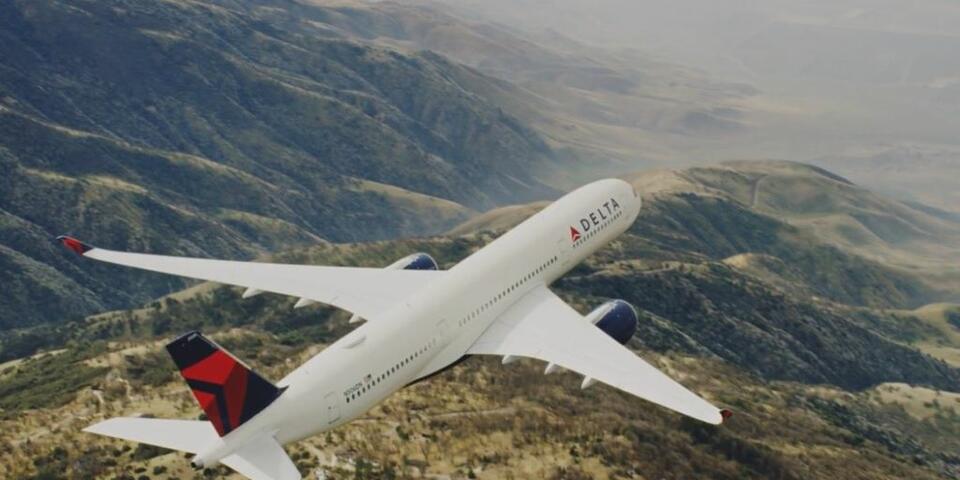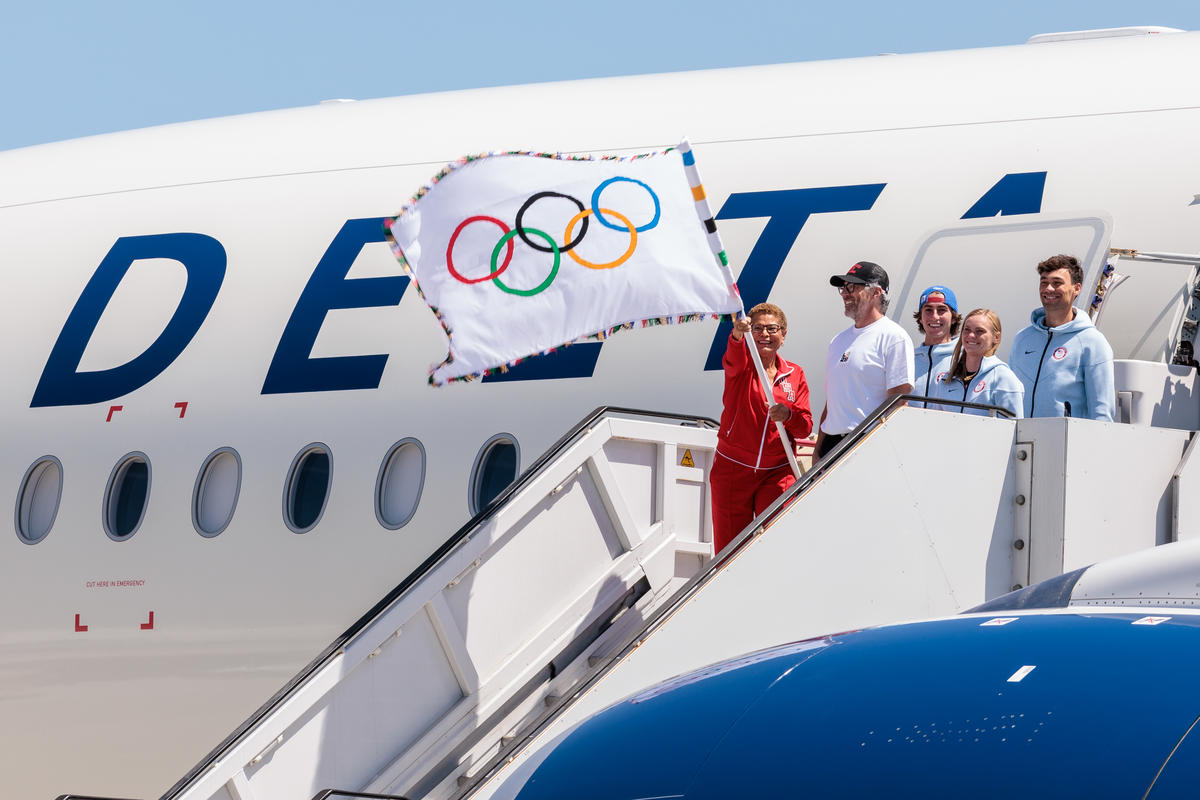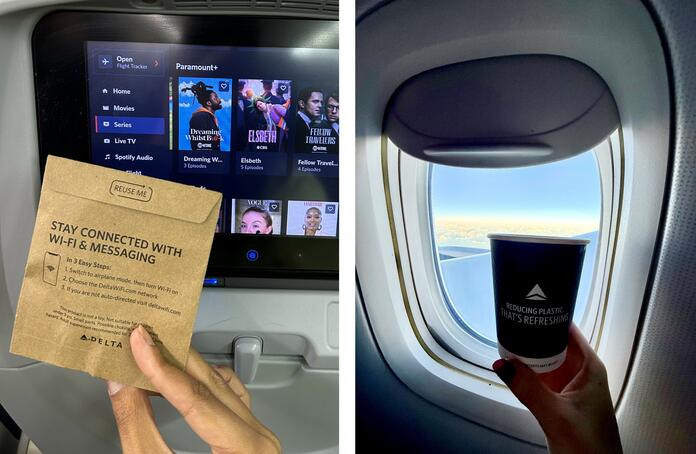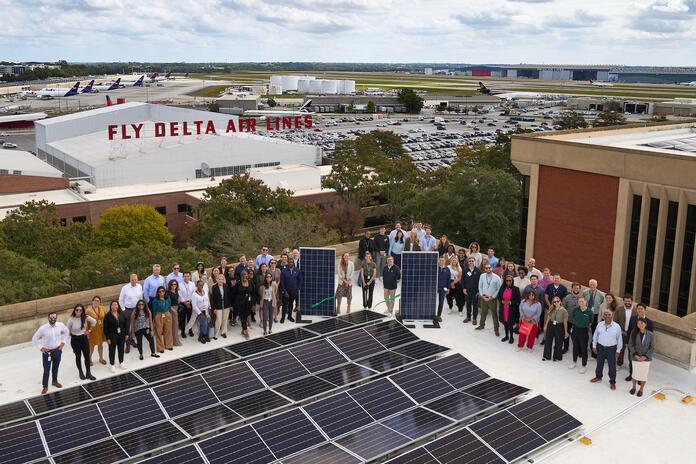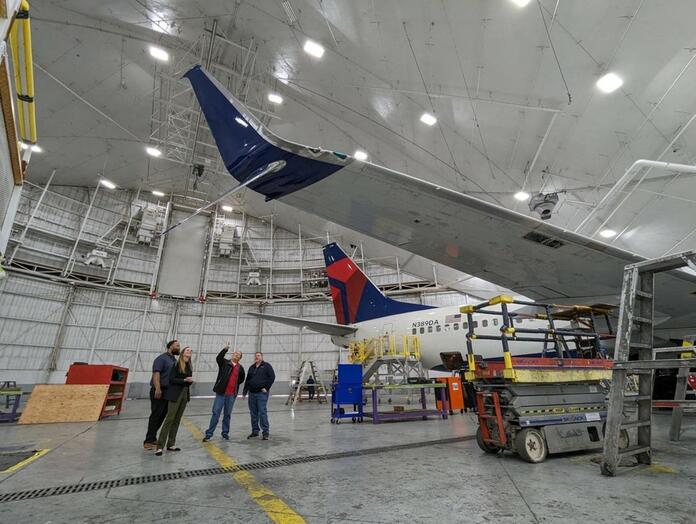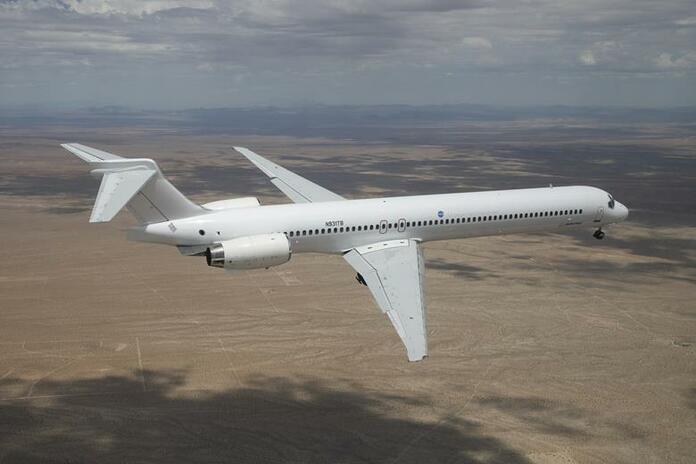Sustainability wrapped: 10 ways Delta made progress toward its goals in 2024
Delta is committed to connecting the world to a more sustainable future of travel. Read about the progress made in 2024 toward its decarbonization and sustainability goals.
On the ground and in the air, Delta is committed to connecting the world to a more sustainable future of travel by focusing on “What We Fly, How We Fly, and the Fuel We Use to get there.” The global airline is prioritizing long-term solutions to fully decarbonize its operations and the industry, while making changes within its control today – like reducing fuel consumption.
“2050 may seem far off, but the reality is, decisions we make today will directly impact our ability to meet our goals in the coming decades," said Delta Chief Sustainability Officer Amelia DeLuca. “With no obvious solution to reach net-zero emissions, we’re exploring different pathways for everything from scaling sustainable aviation fuel to revolutionizing what we fly and how we fly through partnerships across our industry and beyond.”
Here are 10 ways Delta made progress toward its sustainability and decarbonization goals in 2024:
CARBON COUNCIL FUEL SAVINGS SOAR TO NEW HEIGHTS
Delta’s Carbon Council, made up of leaders from across the airline, nearly doubled its fuel savings from 2023, with a cumulative 41 million gallons of jet fuel1 saved in 2024. These fuel savings were achieved through initiatives like enhanced routing and landing procedures, reductions to catering service weight and reduced auxiliary power unit usage. One example of Delta’s enhanced landing procedures that help reduce fuel burn is with Delta and Boeing’s recently certified reduced flaps landing procedure on the 717 fleet, which is expected to save up to 1 million gallons of fuel per year.
Since its inception in 2022, Delta’s Carbon Council has exemplified Delta’s culture of innovation by finding new ways to showcase sustainability-driven operational improvements and efficiencies, which both avoids carbon emissions and can save Delta millions of dollars and gallons of fuel each year. For example, the cumulative 41 million gallons of jet fuel Delta saved in 2024 is equivalent to more than $100M in cost savings for Delta.
1 Relative to what we would have used if Delta had not undertaken any fuel efficiency efforts.
SAF CONTINUES TO PLAY A CRITICAL ROLE IN DELTA’S DECARBONIZATION WORK
Sustainable aviation fuel (SAF) is the most promising lever known today to reduce lifecycle carbon emissions from jet fuel and decarbonize Delta’s operation. However, there isn’t enough SAF available to meet global demand for even a week. Throughout the year, Delta continued to work toward scaling SAF production through a number of initiatives that span policy advocacy, reaching coalition milestones, taking delivery of SAF to key Midwest hubs, and more. Noteworthy milestones reached in 2024 include:
- SAF USAGE: Delta uses approximately 4 billion gallons of jet fuel each year and has set a goal of 10% SAF usage by 2030. In 2024, Delta took delivery of nearly 4x the amount of SAF compared to 2023. Because SAF is not being produced at the scale needed, Delta is collaborating with stakeholders across the SAF ecosystem – from farmers and fuel producers to buyers and policymakers – to further incentivize SAF production and sustain investment in a robust SAF industry.
- GOVERNMENT SUPPORT: Supportive federal and state policies are critical to expanding the SAF market. That's why Delta’s government affairs and sustainability teams have worked together to advocate for policies that make SAF more cost effective to scale production. This year brought key wins for the SAF ecosystem from government policies and the Departments of Energy (DOE) and Transportation (DOT), including: two critical partners, Gevo and Montana Renewables, receiving guaranteed government loans from DOE to help finance large-scale production facilities to produce SAF and renewable diesel in the United States; Buckeye, who helped deliver SAF to Delta hub airports, receiving a DOT FAST-SAF grant to help them grow their blending capabilities in Michigan and Illinois; a deal with the state of California and the California Air Resources Board to accelerate the use of SAF; and the creation of two bipartisan Sustainable Aviation Caucuses in the US House and Senate.
- SAF DELIVERY TO DELTA’S MIDWEST HUBS: For the first time in both Minnesota and Michigan’s aviation history, SAF arrived to two Delta hub airports, Minneapolis-St. Paul International Airport (MSP) and Detroit Metropolitan Airport (DTW), this fall. The two 7,000+-gallon shipments of SAF were made from Minnesota and North Dakota-grown winter camelina as part of Delta’s work with the Minnesota SAF Hub coalition.
- NEW BLENDING FACILITY: Delta’s work with the Minnesota SAF Hub reached key milestones this year. In September, the Minnesota SAF Hub announced the development of the first SAF blending facility in Minnesota, driven by Delta and Flint Hills Resources, which will blend up to 30 million gallons of SAF once fully operational. Other milestones included a ‘Demand Consortium’ with a commitment to purchase the first several million gallons of SAF produced at the facility.
- SAF SPECIALTY FLIGHTS: This summer, Delta’s Global Sustainability team covered the cost of SAF and allocated it to two notable flights - one to Normandy to commemorate the 80th anniversary of the D-Day Invasion and a second for the LA28 Flag Flight which carried the Olympic flag from Paris to Los Angeles. Because SAF supply remains limited in both amount and location, the industry uses a “book and claim” accounting process to enable uplift of SAF where it is available to displace conventional jet fuel and allocate or claim it wherever it is needed.
REDUCING SINGLE-USE PLASTIC IN FLIGHT
As part of efforts to reduce single-use-plastic in flight, Delta has made progress on two big milestones. Last year, Delta announced it was testing a new paper cup on board, which will help eliminate the nearly 7 million pounds of single-use-plastic on board annually once fully implemented. Last month, the paper cups rolled out on all international flights and can be expected on all domestic flights in the first half of 2025. Additionally, Delta has transitioned to new kraft paper ear bud wrapping, a shift from the traditional plastic packaging on the more than 60 million units handed out each year.
TESTING NEW TECHNOLOGY TO SAVE ON JET FUEL WITH TAXIBOT
Delta is working with the Port Authority of New York and New Jersey and Smart Airport Systems to secure FAA approval for TaxiBot. TaxiBot, short for taxiing robot, is a towing tractor that is primarily controlled by the pilot and used to tow planes to and from the end of the runway, eliminating the need for a plane to use jet engines to taxi on the ground, ultimately reducing jet fuel burn and reducing CO2 emissions. Proof-of-concept program development and testing is underway at John F. Kennedy International Airport in in New York, as well as at Charles-de-Gaulle Airport in Paris, Brussels Airport in Belgium and Amsterdam Airport Schiphol in the Netherlands. TaxiBot is one of the latest partners of the Sustainable Skies Lab and is another example of changes Delta is looking to make in its control today to save on jet fuel.
JFK Taxibot demo
DELTA’S ONGOING CAMPUS GREENING INITIATIVES AT ATLANTA HQ
The global airline has also taken a number of measures at its General Office (G.O.) headquarters in Atlanta, Georgia, to be more sustainable, including installing rooftop solar panels in fall 2024. The solar panels were installed by Cherry Street Energy, and once fully installed, this solar project will cover 60 percent of electricity consumption at Delta’s Atlanta Campus. Other campus greening initiatives this year included installing 50+ additional EV charging ports on Delta’s General Office and TechOps campuses, bringing the total number of charging ports on Delta’s G.O. and TechOps campus to more than 160; and rolling out a centralized waste program inclusive of a three-bin system with waste, recyclable and compostable materials to assist in landfill diversion.
NEW FOAM ENGINE WASHING WITH AEROCORE DRIVES FUEL SAVINGS
Earlier this year, Delta TechOps signed a 10-year agreement with AeroCore Technologies for their patented Nucleated Foam Technology. The foam engine wash improves on-wing engine performance by more effectively removing accumulated dirt and debris than traditional water wash programs. This allows the engine to run more efficiently and lowers engine temperatures, which helps to reduce fuel consumption and emissions. Delta expects to drive 4 million gallons in fuel savings each year from the new foam engine washes. This is another example of Delta making changes within its control today to be more fuel efficient through its partnerships.
ENHANCED WINGLET MODIFICATIONS
Over the last several years, Delta has been working on adding enhanced winglets and lightweight landing gear to its fleet to make them as efficient as possible. Winglets are the curved surfaces seen on the wingtip of aircraft to smooth airflow and reduce drag, allowing aircraft to burn less fuel. Delta will finalize its modifications of the split-scimitar winglet upgrade on the 737-800 fleet by the end of 2025. This milestone will mark the completion of Delta adding the most advanced winglet technology available to all existing fleets that can be modified.
DELTA’S CONTINUED SUPPORT OF BOEING’S X-66 SUSTAINABLE FLIGHT DEMONSTRATOR
A key part of Delta’s sustainability strategy includes revolutionizing what and how the airline flies. Last year, Delta joined a sustainability coalition with Boeing and NASA to support the Sustainable Flight Demonstrator program, also known as the X-66. Throughout 2024, Boeing and Delta made progress toward the development of the X-66 research aircraft, which is being used to test fuel-saving technologies. It’s also important for the Transonic Truss-Braced Wing (TTBW) research by Boeing and NASA. The TTBW concept involves an aircraft with extra-long, thin wings stabilized by diagonal struts, which can help an aircraft be more fuel efficient than a traditional airliner by reducing drag and ultimately reducing fuel burn. Boeing will begin removing the X-66's wings and fuselage selections and then equip them with Boeing’s TTBW. The goal of this work is to validate that the wing can improve fuel efficiency, calibrate design tools, and refine other aspects of the design. Two retired Delta MD-90 aircraft were sold to Boeing and are being used as the initial demonstrator and proof of concept.
NEW CROSS-DIVISIONAL COUNCILS TO CHAMPION SUSTAINABILITY INITIATIVES
Building on the success of its cross-divisional Carbon Council, this year, Delta used the same model to launch additional councils, SAF Council and Green Council. SAF Council. SAF Council is made up of cross-divisional Delta Officers to oversee Delta's portfolio of programs and development initiatives related to the scaling and securing of SAF. Green Council is a forum for Delta's top corporate accounts and leading companies to provide input on Delt’s sustainability initiatives. The councils are all designed to support cross-divisional collaboration for sustainability initiatives that can positively impact Delta.
EMBEDDING SUSTAINABILITY THROUGHOUT THE BUSINESS WITH OPERATIONAL KPIs
In 2024, Delta introduced new operational sustainability KPIs to engage employees and unify efforts in driving toward Delta’s sustainability goals. Nearly half of all Delta employees now work in a division with a KPI that can directly contribute to reducing fuel usage and improving fuel efficiency. Progress on these metrics is reviewed monthly with senior leaders as part of Delta’s process to deliver operational excellence. Noteworthy KPIs include key metrics like weight efficiency, through thoughtful adjustments to on-board service weight, and APU run-time between flights. APU refers to the auxiliary power unit, or the small engine at the back of the plane that helps provide power and temperature control while the plane is on the ground. These KPIs focus on some of Delta’s top opportunities to reduce emissions and improve fuel efficiency.
2025 AND THE NEXT CENTURY OF FLIGHT
As Delta gears up to celebrate its centennial anniversary next year, the airline remains committed to finding new ways to make progress toward its decarbonization and sustainability goals. Reaching net-zero emissions by 2050 will take all of us working together – within Delta, the aviation industry and beyond.
© 2026 Delta Air Lines, Inc.
